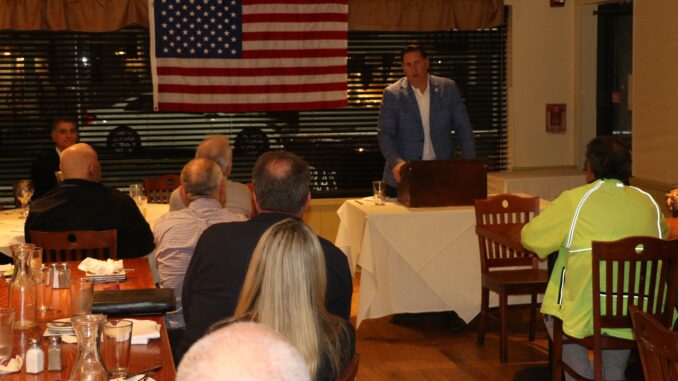
By Hank Russell
The Center for Cost Effective Government hosted Mike Florio, the Chief Executive Officer of the Long Island Builders Institute, during its “Pizza & Politics” event at Butera’s in Sayville. The topic focused on the rising cost of insurance in the state and why these rates are so high.
Florio said the Scaffold Law is one of the oldest law on the books, having become law in 1885. He said supporters of the law say that it protects workers from injury on job sites, but it has devolved into a way to punish landowners and construction companies, even if the worker was under the influence or faking an injury.
“If a guy comes in [to the job site] drunk or high, and fell off a ladder, it doesn’t matter [if it was your fault],” Florio said. “The owner is 100% liable.”
He also said there have been instances of “widespread fraud,” with employees caught on camera falling down on purpose and another co-worker calling for an ambulance, thereby driving up insurance costs for their employer.
“You have one side saying, ‘It’s about worker safety, it’s a dangerous job,’” Florio said, adding that, when someone is injured, “the trial lawyers come out for a payday. … If this were a safety issue, you think New York would be the safest state, but that’s not the case. We’re in the middle of the pack.” He noted that Illinois, which was the last state to get rid of the law, had seen “some improvement” in workplace safety.
But it’s not just workers who are in on this scam. According to Florio, there are a group of doctors at an orthopedic practice who ordered medications and surgeries “that were not necessary.” Then, there are organized crime organizations and construction firms that “exploit” migrants “all working in cahoots with each other.”
Because of the Scaffold Law, “insurers are leaving the state,” Florio said, thereby ‘[making] it more expensive for us.”
The reason why there is continuous support for this law is that “you run up against a very powerful lobby,” namely the labor unions and trial lawyers. However, he said, some elected officials are trying to do something about it, U.S. Representative Nick Langworthy (R-Jamestown) introduced the Infrastructure Expansion Act that would exempt federal projects from the Scaffold Law. While it “doesn’t get to the root of the problem, it’s a step in the right direction,” Florio said.
Meanwhile, state Assemblyman Ari Brown (R-Cedarhurst) introduced a bill that would exempt Long Island projects from the law. “It’s a great bill, but it doesn’t stand a chance in hell.”

Florio was preceded by state Senator Dean Murray (R-Medford), who spoke about rising crime in the state and the Metropolitan Transportation Authority. Murray said, when it comes to crime, “New York is going in the opposite direction. … It’s as pro-criminal as it gets.”
The main driver of this spike in crime, he said, was Raise The Age, which raises the age of criminal responsibility to 18 years of age. “You have these people saying, ‘They’re teenagers, they’re just kids,’” he said. “Rather than taking them to criminal court, they go to Family Court, get a slap on the wrist and then they’re let go.”
Because of Raise The Age, the number of teenagers involved in shootings, getting shot and arrested for shootings “more than doubled,” Murray said. Even worse, they are released soon after being arrested. “Nine times out of ten, by the time the police fill out the paperwork, [the offenders] are back on the street.”
The discussion moved to the MTA. “As we are paying more [for fares], the payroll tax is back in action,” Murray said. “But every single time, the MTA says, ‘We need more money.’ … They have lost money because fare evasion has gone through the roof.”
According to Murray, more than $500 million has been lost so far this year due to fare evasion. He predicted that, next year, that amount will double to $1 billion. The MTA formed a task force to fight fare evasion, so what they did, Murray said, was they deployed officers to the stations with the highest incidences of fare evasion, but they could not confront the offenders because it might devolve into violence.
“So the officers do nothing [to stop fare evasion] and you wonder why [fare evasion happens],” Murray said.
Meanwhile, the MTA has raised fares by 4.4% and overtime hit a record of $1.42 billion. “When you start to add those numbers up, that’s baffling,” Murray said. In response, he introduced legislation calling for a control board to examine MTA’s expenses, but that has been met by “pushback.”
“[The MTA] keeps saying, ‘We need more money,’” Murray said. “We need to say, ‘No, you have to do better with what you got.’”

